May 17, 2025 | 09:00 GMT +7
May 17, 2025 | 09:00 GMT +7
Hotline: 0913.378.918
May 17, 2025 | 09:00 GMT +7
Hotline: 0913.378.918
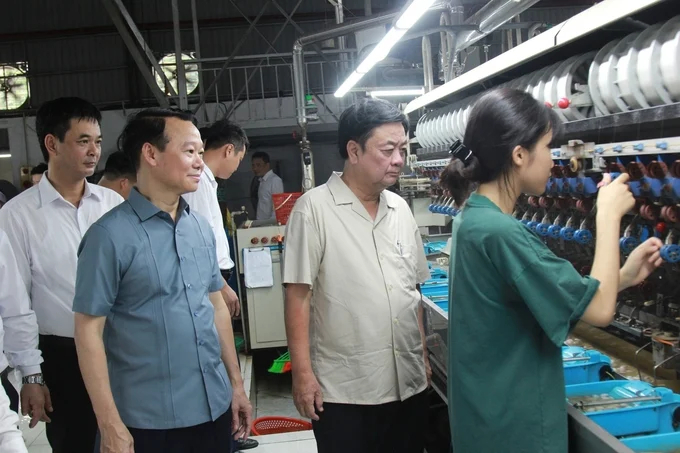
Minister of Agriculture and Rural Development Le Minh Hoan (second from right) during a recent visit to the silk nursery factory of Yen Bai Mulberry Joint Stock Company. Photo: Thanh Tien.
In early 2023, the silk cocoon processing factory of Yen Bai Mulberry Silk Joint Stock Company officially came into operation. This is a major turning-point that helps form silkworm production chains in Yen Bai province, creating a solid fulcrum for thousands of farming households in the province, and is a driving force to help localities sustainably develop the mulberry industry.
Yen Bai Mulberry Joint Stock Company was established on December 9, 2020. By February 2021, the company was approved for investment policy according to Decision No. 310 dated February 25, 2021 of the People's Committee of Yen Bai province on investment in building a silk reeling factory, with the main business line being yarn production.
Currently, the silk reeling factory is built on a used land area of nearly 23,000 m2, of which the factory built area is more than 4,000 m2, and the auxiliary construction system is 2,000 m2.
The silk yarn purchasing and processing factory officially went into operation on March 1, 2023 with 4 machine rigs with a capacity of 2,500 kg of cocoons/day. After processing, silk products will be exported to India, Japan and European markets. In 2023, the company has revenue of more than 4 million USD. Currently, the company creates jobs for more than 180 local workers with an average income of 240 - 480 USD/person/month, 100% of stable workers participate in social insurance and other prescribed regimes.
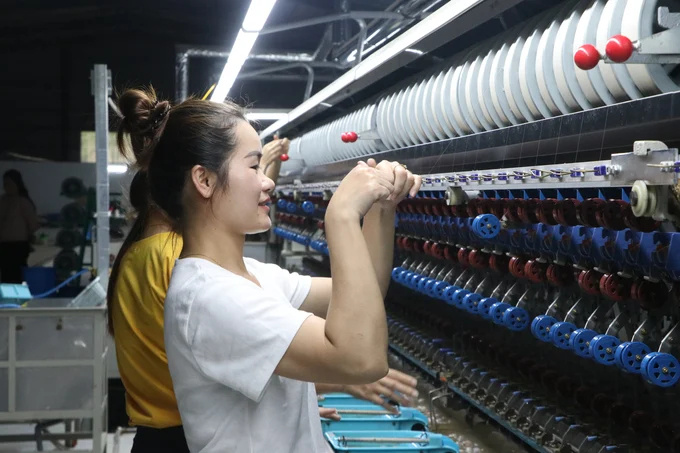
Yen Bai Mulberry Joint Stock Company has currently created jobs for more than 180 local workers. Photo: Thanh Tien.
Since the silkworm factory came into operation, people in Tran Yen district in particular and Yen Bai province in general have really seen the value of mulberry growing and silkworm raising. The mulberry growing area is constantly increasing, and the quality of silkworm cocoons is also impro8000ved. Currently, the entire Yen Bai province has nearly 1,200 hectares of mulberry trees, of which mainly concentrated in Tran Yen district with about 1,000 hectares, the remaining is grown in Van Yen and Van Chan districts. The annual output of silk cocoons in the whole province reaches nearly 1,300 tons, with an average income of 8,000 - 10,000 USD/ha/year.
Ms. Nguyen Thi Tam, who has been involved in mulberry growing and silkworm raising for a long time in Bao Dap commune (Tran Yen district), shared that after nearly 20 years of participating in growing mulberry and raising silkworms, she found that this is a very suitable profession for rural people. However, due to market conditions and epidemics, silk cocoon prices are often unstable, depending on the year. In the past, cocoon products were mainly purchased by private traders, so prices were unstable and sometimes even forced. Therefore, when there was a silk cocoon processing factory located locally, she and hundreds of local households felt secure in expanding the production area.
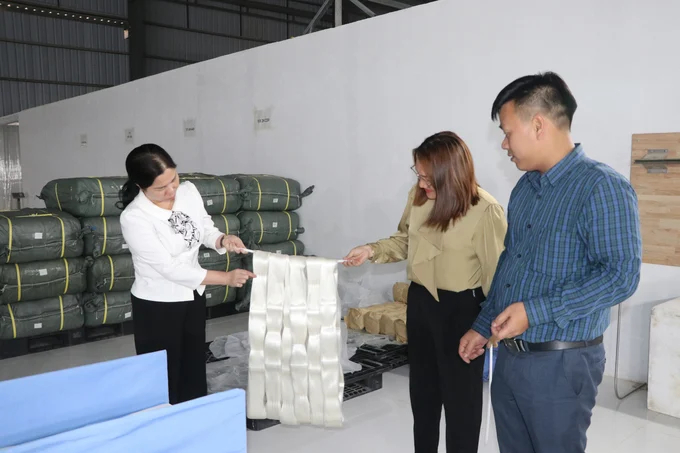
Yen Bai's silk cocoon output always increases each year to meet the raw material needs of Yen Bai Mulberry Silk Joint Stock Company. Photo: Thanh Tien.
Ms. Tam and other households in the commune participated in the mulberry growing and silkworm raising cooperative, silkworm seed supply cooperative, then purchased all products at high, stable prices to sell to the factory.
Currently, Yen Bai Mulberry Joint Stock Company is an important link in the silk production chain. This is a unit that connects and introduces suppliers of silkworm eggs and silkworm rearing supplies to cooperatives and silkworm raising households in the province, and provides technical guidance to silkworm farmers to improve the quality of cocoons.
The company has signed a value chain cooperation agreement with cooperatives in Van Yen and Tran Yen districts, committing to consume all silkworm cocoon products made by the people. Thanks to that, up to now, mulberry growing and silkworm raising have become a key industry in agricultural production of many localities in Yen Bai province.
Having a local cocoon purchasing and processing factory is the most reliable fulcrum to help farmers feel secure in production, expanding hundreds of hectares of mulberry trees each year.
Mr. Vu Xuan Truong, Director of Yen Bai Mulberry Joint Stock Company, said that in order for the factory to operate sustainably and effectively, the company has provided vocational training for local workers and neighboring areas. The factory can purchase all cocoon output from silkworm raising households in Yen Bai province through signing contracts with cooperatives and traders at stable prices.
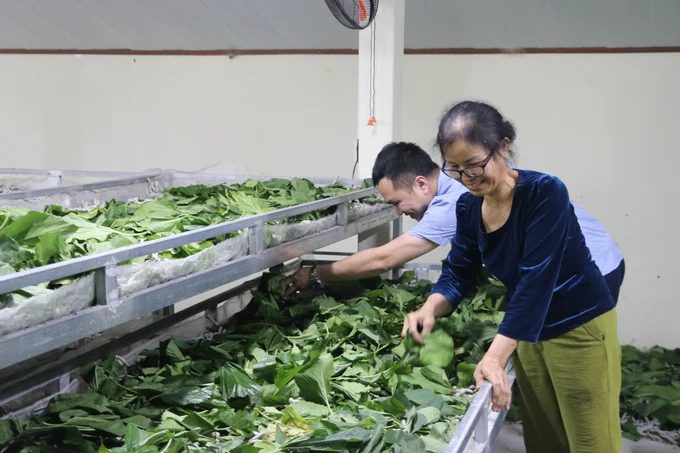
Farmers' silk products have been consumed stably through cooperatives, so farmers feel secure in sticking with them and expanding production scale. Photo: Thanh Tien.
Currently, the company is continuing to coordinate with localities in the province to expand mulberry growing areas, improve the quality of labor resources, increase technical support, guide the transfer of scientific and technical advances, silkworm farming equipment and utensils for cooperatives and farming households to improve productivity and quality of silkworm cocoons.
In the coming time, Yen Bai Mulberry Joint Stock Company will install 2 more silk reeling machines, bringing the total number to 6 operational rigs, with a capacity of 150 tons of silk/year, equivalent to the amount of cocoons consumed from 1,100. up to 1,200 tons/year. It is expected that before 2030, the company will build additional workshop No. 2, doubling the existing capacity.
In the future, people will move towards more environmentally friendly products, and silk is a very friendly product. Today, the use of industrial fibers for garments is gradually decreasing, natural fibers such as bamboo, cotton and especially silk are dominating the majority of the world market. Currently, Yen Bai Mulberry Silk Joint Stock Company's silk products are mainly for export. Oriented to 2030, the company will aim to spin silk and weave fabric from domestic silk to increase the added value of Vietnamese agricultural products.
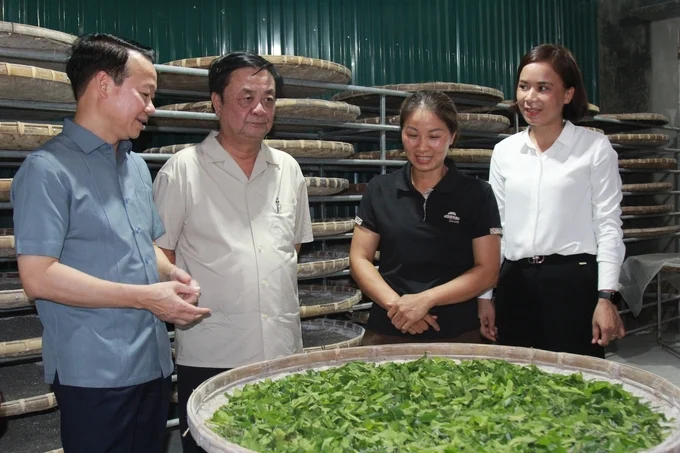
Minister of Agriculture and Rural Development Le Minh Hoan (second from left) visited the model of applying science and technology to raising silkworms of farmers in Tran Yen district (Yen Bai). Photo: Thanh Tien.
Countries with a tradition of using silk fabrics such as Japan, China, India and countries in the Middle East, Europe, and North America have an increasing demand for this product, while the supply of silk products tends to decrease. Countries with a tradition of producing mulberries such as Japan and Korea now produce very little. Even China, the world's leading country in mulberry production, has had a decrease in output in recent years.
Therefore, the formation of a mulberry production chain with the core role of Yen Bai Mulberry Joint Stock Company will be a solid foundation to expand raw material areas, bringing the mulberry industry to increasingly sustainable development in Yen Bai province.
Mr. Tran Nhat Tan, Secretary of Tran Yen District Party Committee, said that the district has been closely coordinating with Yen Bai Mulberry Joint Stock Company in transferring science and technology and providing technical training to farmers to improve productivity, output and quality of silkworm cocoons. Every year the district mobilizes people to plant about 80 - 100 hectares of new mulberries with mulberry varieties provided by the Central Mulberry Research Center. Besides, more craft villages will be built, attracting silk processing factories, ect.
Translated by Phuong Linh

(VAN) Vietnam’s TH Group officially put its high-tech fresh milk processing plant into operation in the Russian Federation, marking a historic moment as the first TH true MILK cartons were produced in Russia.

(VAN) Use of high-quality broodstock and biotechnology is regarded as the most effective approach to ensuring sustainable and economically viable shrimp aquaculture ahead of climate change and the emergence of increasingly intricate disease patterns.

(VAN) Carbon farming is a form of agricultural practices that helps absorb more greenhouse gases than it emits, through smart management of soil, crops, and livestock.

(VAN) This is a key content of the Memorandum of Understanding recently signed between the Vietnam Fisheries Society and Kunihiro Inc of Japan.

(VAN) To achieve the goal, local authorities and businesses in Kon Tum province have fully prepared the necessary conditions for the new Ngoc Linh ginseng planting season.
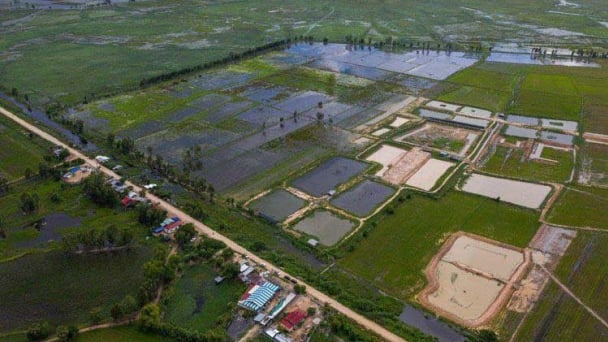
(VAN) Jiangsu province is gearing up to host training programs in Phnom Penh, the capital of Cambodia, this year to establish the Fish and Rice Corridor.
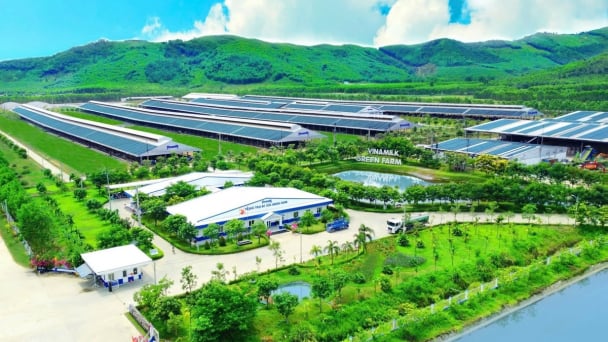
(VAN) Le Hoang Minh, representing Vinamilk, shared the company's experience in energy saving and green energy transition for production at a workshop held during the P4G Summit.